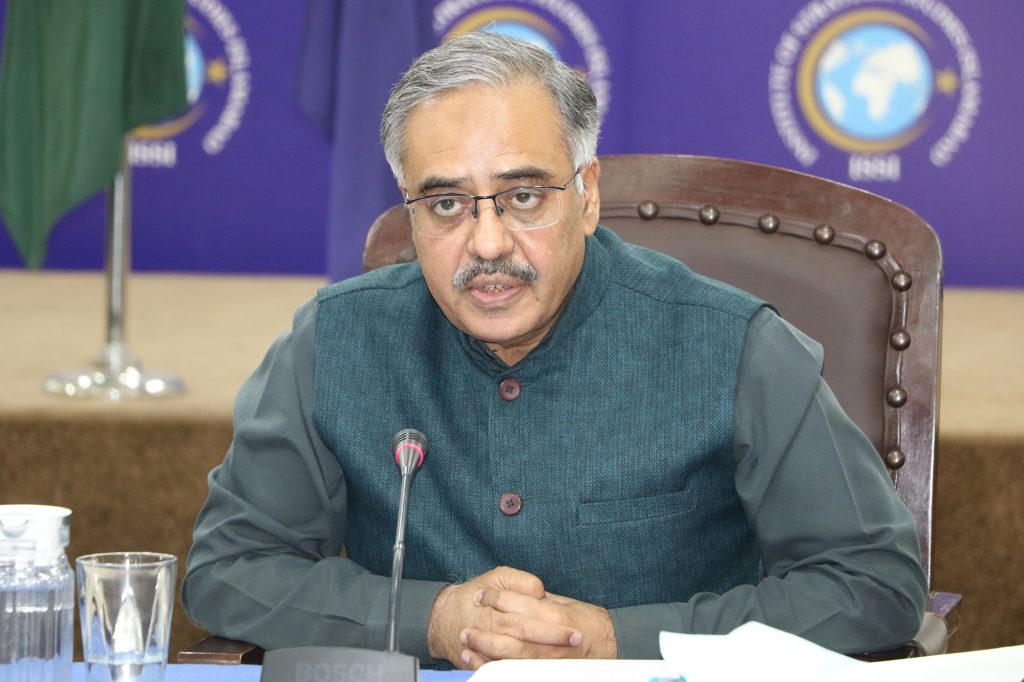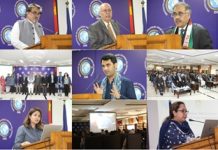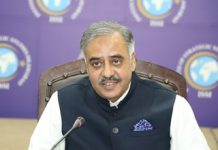Remarks by DG ISSI Ambassador Sohail Mahmood on occasion of Distinguished Lecture by SCO Secretary General on “SCO’s Role in a Changing Global Order”
18 April 2025

It is a distinct pleasure to welcome everyone to ISSI. We are honoured to have His Excellency Nurlan Yermekbayev, Secretary General of the Shanghai Cooperation Organisation (SCO), for our Distinguished Lecture today. Secretary General Yermekbayev has had an illustrious career spanning over several decades and serving with great distinction in many diplomatic and Ministerial assignments. Since assuming the office of Secretary General in January 2025, he is guiding SCO on a path of sustained cooperation and progress. We welcome him heartily on his first visit to Pakistan in his new position.
In just over two decades, SCO has evolved into one of the world’s most comprehensive and dynamic multilateral platforms. With membership encompassing nearly half the world’s population and accounting for 25% of the global GDP, SCO’s global relevance is firmly established. From its inception as the ‘Shanghai Five’ in 1996 to its expansion into a trans-regional organization that now includes nine member states and numerous Observers and Dialogue Partners, SCO is a compelling example of multilateralism in action. This also illustrates its open, inclusive and forward-looking character.
The essence of the SCO lies in its founding principles — mutual trust, mutual benefit, equality, consultation, and respect for cultural diversity. These are the foundations of what is now known as the “Shanghai Spirit” — a spirit that has withstood the test of times and shifting geopolitical currents and has become indispensable today.
What makes the SCO unique is the breadth of its agenda — extending far beyond traditional security concerns to include economic cooperation, cultural dialogue, educational exchange, and people-to-people connectivity. It has remained anchored in its commitment to counter the “three evils” — terrorism, separatism, and extremism — through joint efforts such as the Regional Anti-Terrorist Structure (RATS). In 2023, RATS extended its remit to include cyber security, demonstrating SCO’s responsiveness to evolving security threats. The SCO has also remained focused on regional stability, including efforts for stabilization of post-conflict Afghanistan.
Equally noteworthy are the strides made in economic cooperation. In 2020, the collective GDP of SCO member states surpassed $ 25 trillion. The group’s trade volume has increased more than nine-fold since its founding, from $ 667 billion in 2001 to over $ 6 trillion today. These are not just numbers — they reflect in practical terms the vision of connectivity and shared prosperity. Initiatives like the China-Kazakhstan Horgos International Border Cooperation Center, the Yangling Agricultural Hi-tech Zone, and the SCO Local Economic and Trade Cooperation Demonstration Zone in Qingdao highlight the Organization’s growing economic footprint.
Cultural and educational cooperation has also become a hallmark of the SCO. Platforms like the SCO Kunming Marathon, the Arts Festival, and the SCO University with its over 60 partner institutions, bring together people from diverse traditions and foster a sense of unity. Recent developments — such as the Asia Women’s Forum and efforts to jointly nominate heritage sites to UNESCO — show how SCO continues to innovate in areas that enhance social and cultural collaboration.
As the world experiences a shift toward multi-polarity, SCO stands as a symbol of how inclusive regionalism can help shape a more stable and balanced international order. The current global context — marked by economic uncertainty, the so-called ‘trade and tariff wars’, strategic rivalries, and environmental stress — calls for renewed commitment to cooperation, dialogue, and shared development. The SCO embodies this spirit of constructive engagement.
Importantly, we must also acknowledge the challenges ahead. Geopolitical tensions, environmental issues such as water scarcity, and intra-member divergences on policy and key initiatives remain hurdles to be addressed. However, with political will and institutional innovation, the SCO can continue to evolve and deliver tangible outcomes for its members.
For its part, Pakistan remains firmly committed to the principles and objectives of the SCO. As a full member since 2017, Pakistan has consistently advocated for stronger economic integration, regional connectivity, and people-centric cooperation. Pakistan’s geographical location enables it play a bridging role between South Asia and Central Asia and also facilitate land and maritime connectivity for member states through the transformational China Pakistan Economic Corridor (CPEC). Pakistan believes that the future agenda of SCO must place greater emphasis on areas such as digital innovation, green energy, food security, and youth development — all the while preserving the core ethos of the ‘Shanghai Spirit.’
Pakistan had the distinct honour of hosting the SCO Council of Heads of Government (CHG) meeting in 2024 and it showcased Pakistan’s constructive role in advancing SCO’s developmental, economic, and connectivity agenda. Looking ahead, Pakistan will be honoured to host the SCO Council of Heads of State (CHS) Summit in 2027. As a responsible and constructive member of the SCO family, Pakistan would make a pivotal contribution as the SCO chair as well.
It is heartening to note that SCO is finalizing a new development strategy till 2035. This strategic vision must integrate the lessons of the past while embracing the opportunities of the future. It should reflect not just the aspirations of its founding members but also the perspectives of its newest partners.
We would hear on these and all other major aspects of SCO’s eventful journey in a rapidly transforming world from the distinguished Secretary General. It is important to lend full support to the Secretary General as he works to strengthen SCO’s evolution and ensure that it serves as a pillar of peace, stability, and sustainable development in a changing global order. For its part, as a think-tank and research institution, the ISSI would continue to make its rightful contribution to reinforce these worthy endeavours.
Thank you.















